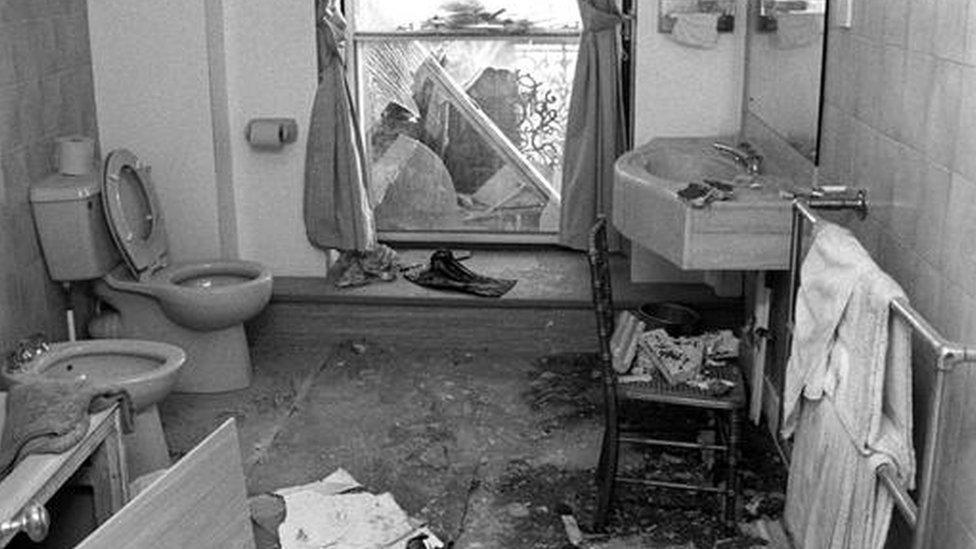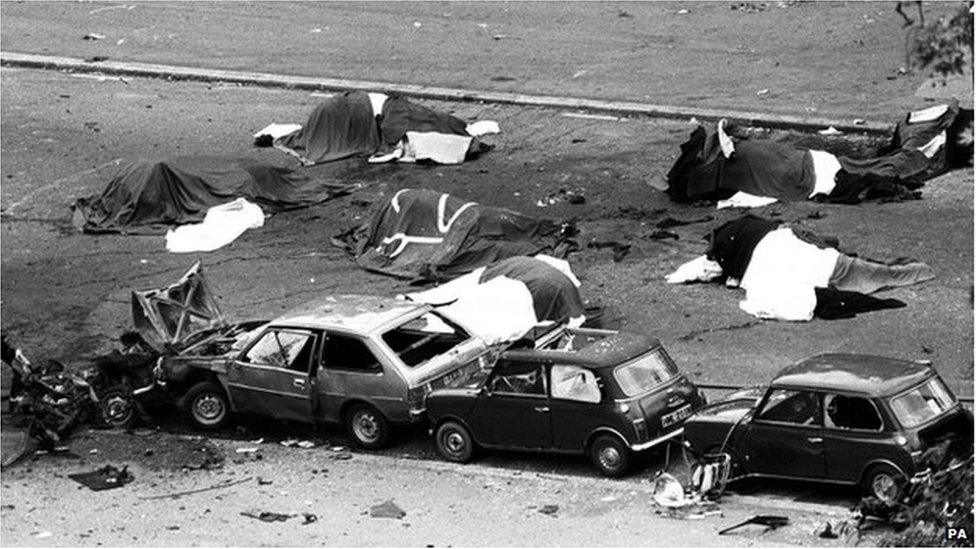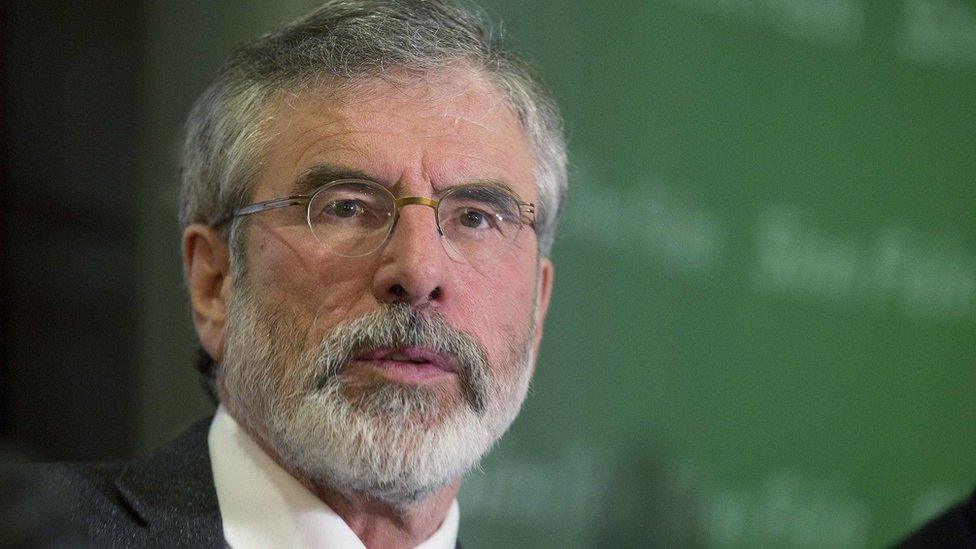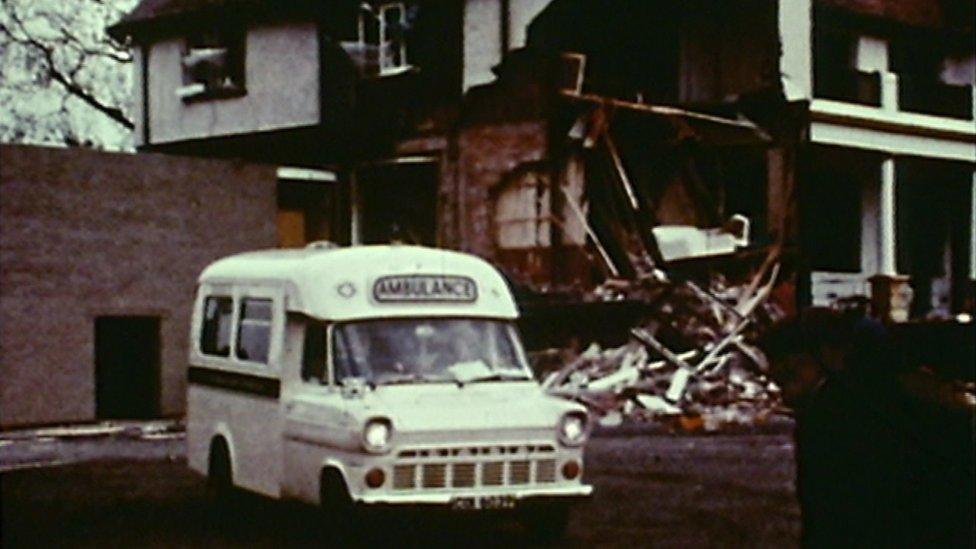IRA Brighton bomb: Patrick Ryan admits link to 1984 attack
- Published
'I would like to have been more effective'
A man who helped arm the IRA has admitted links to major bomb attacks, including one which targeted Prime Minister Margaret Thatcher in 1984.
Patrick Ryan, a former priest from Tipperary, gave an interview to a BBC NI Spotlight series on the Troubles.
Mrs Thatcher once described him as having an "expert knowledge of bombing".
Asked if she was right to connect him to events like the Brighton bomb, he replied: "One hundred per cent."
Five people died when an IRA bomb exploded inside the Grand Hotel, where Margaret Thatcher's ruling Conservative Party was holding its annual conference.
The prime minister narrowly escaped injury in the attack on 12 October 1984.

Margaret Thatcher's bathroom in the Grand Hotel, Brighton, following the explosion
Episode three of Spotlight on the Troubles: A Secret History explores Mr Ryan's key role in IRA arms shipments from Libya.
In the programme, he takes credit for introducing the organisation to a type of timer unit it used to set off bombs.
Asked if he had any regrets, Mr Ryan said: "I regret that I wasn't even more effective, absolutely.
"I would have liked to have been much more effective, but we didn't do too badly."
'Brought before the courts'
Speaking to BBC Radio Ulster's Nolan Show, DUP MP Sir Jeffrey Donaldson said he wanted an apology from the Irish government for not extraditing Mr Ryan.
He said the Irish government should now "step up to the mark" and cooperate with extradition.
"He is an elderly man and the sooner he is brought before the courts the better for the pursuit of justice," he said.
Ulster Unionist councillor Danny Kinahan, a former member of the Blues and Royals, an Army regiment whose members were killed in the Hyde Park bombing in 1982, said it was "extremely uncomfortable to see a former priest seemingly gloating in the part that he played in the murder of my friends".

Four soldiers and seven horses were killed in the Hyde Park attack
"If Patrick Ryan happens to live in the Republic of Ireland, this will be a test of the Varadkar government`s commitment to righting the wrong of the Irish government`s refusal to extradite Ryan to the United Kingdom in 1988," he added.
TUV leader Jim Allister also called for an apology from the Irish government and told the Nolan Show Mr Ryan should be "pursued" for the crimes he admits to in the programme.
"I believe when someone boasts of the terrible crimes that he has boasted of then there should be no end to justice," he said.
"If it's right to pursue British soldiers, and it seems that is the perceived wisdom, then why would it not be right to pursue Ryan for all his crimes which he has self-confessed to?"
Mr Ryan was once the subject of an extradition battle after being arrested with cash and bomb-making materials in Belgium in 1988.
Brighton victims
Repatriated to Ireland, the country refused to extradite him to the UK believing he would not receive a fair trial.
Those who died in the Brighton bomb were Anthony Berry MP, Roberta Wakeham, Eric Taylor, Muriel Maclean and Jeanne Shattock.
Many more were injured including Norman Tebbit, now a peer, and his wife.
The then trade secretary and his wife Margaret were lying in bed when their ceiling collapsed. Lady Tebbit remains paralysed to this day.
Patrick Magee, who planted the bomb, subsequently received eight life sentences, seven of them related to the bombing.
Four members of an IRA "active service unit" were also jailed for involvement in the plot.
Magee was released under the Good Friday Agreement in 1999.
Episode three of Spotlight on the Troubles: A Secret History will be shown Tuesday 24 September at 21:00 BST on BBC One Northern Ireland and BBC Four. Episodes one and two can be viewed now on the BBC iPlayer.
- Published17 September 2019

- Published15 September 2019
